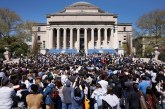

Informed and transparent decision-making is an essential pillar of good local governance. In Davis, this pillar is eroding. Recent years have seen multiple alarming instances of secretive action, shortsighted planning, and disconnect between community and leadership priorities.
We the undersigned—including current and former members of city commissions—call on City Council to address these issues. Specifically, we urge swift adoption of the attached common-sense proposals regarding (1) transparency, information disclosure and public engagement, (2) city commissions, and (3) advancement of significant actions and initiatives.
An unparalleled level of civic engagement and civic pride is one of Davis’s greatest strengths. Over 120 Davis citizens participate on city commissions (a term that also includes city boards, task forces, and committees), volunteering substantial time and effort to hear public comments, provide expert analysis, and propose informed actions on the issues that shape Davis’ present and future. In short, commissioners work tirelessly to ensure that the public voice is heard at all levels.
Because they serve as conduits between Davis government and Davis residents, commissioners are sometimes referred to as the “eyes and ears” of the City Council. Unfortunately, distance has grown between the City’s eyes and ears and its core executive bodies. Council and staff routinely make major decisions following only cursory consultation with relevant commissions. In the most egregious cases, such as with the BrightNight lease option agreement, relevant commissions are not consulted at all.
When commissions do have the opportunity to give input, commission perspectives are often given less weight than staff perspectives. This is evidenced in part by the fact that staff  representatives regularly participate in Council deliberations on key items, but commission representatives are rarely invited or allowed to participate.
representatives regularly participate in Council deliberations on key items, but commission representatives are rarely invited or allowed to participate.
Other challenges further undermine the capacity of city commissions to participate actively in decision making.
First, Council makes very little information available about the nature of its closed sessions. While confidentiality of details may be justifiable in some cases, near-complete opacity surrounding the subjects and outcomes of closed sessions is not.
Second, conflicting guidance from City staff renders it functionally impossible for different commissions to collaborate on topics of mutual interest.
Third, the City provides almost nothing in the way of commissioner onboarding and training. This means that commissions are largely populated by individuals who have deep subject- matter expertise, but limited knowledge of how to contribute that expertise productively.
City Council can correct these problems by adopting the attached proposals. The result will be a Davis that is shaped by all its residents—a Davis that is not just a city, but a community.
The following signatories to this letter and the attached proposal are signing as individuals, not as official representatives of their city commissions or any other organization. Names are listed in alphabetical order, and people’s affiliations are noted for information only.
Crilly Butler, former Commissioner, Bicycling, Transportation and Street Safety Commission
Michael Corbett, former Mayor of Davis
Larry Guenther, Chair, Tree Commission
Dillan Horton, Chair, Police Accountability Commission
Lorenzo Kristov, Commissioner, Utilities Commission
Elizabeth Lasensky, Chair, Senior Citizen Commission
Richard McCann, Commissioner, Natural Resources Commission
Roberta Millstein, Chair, Open Space and Habitat Commission
Jeff Mischkinsky, Member, Broadband Advisory Task Force
Alan Pryor, Commissioner, Natural Resources Commission
Greg Rowe, Commissioner, Planning Commission
Hannah Safford, Co-Chair, Natural Resources Commission
Johannes Troost, Chair, Utilities Commission
Erik Vink, Alternate, Recreation and Park Commission
Colin Walsh, Commissioner, Tree Commission
Matt Williams, former Chair, Finance and Budget Commission






Quick question… as this appears to be “an initiative”, has it been vetted/discussed by a full meeting(s), publicly notice, with the opportunity for public comment/input, with each and every commission affected? Prior to CC consideration?
Sorry for the slow answer Bill. Just got to today’s Vanguard now. The effort was an initiative … common noun defined immediately below, as opposed to an Initiative … proper noun defined further on down the comment
in·i·ti·a·tive
/iˈniSH(ē)ədiv/
common noun
1. the ability to assess and initiate things independently.
“use your initiative, imagination, and common sense”
Similar words: enterprise, inventiveness, resourcefulness, capability, imaginativeness, ingenuity, originality, creativity, drive, dynamism, ambition, ambitiousness, motivation, spirit, verve, dash, energy, vitality, vigor, leadership, vision, get-up-and-go, zing, push, pep, zip, punch, pizzaz
Opposite words: unimaginativeness
2. the power or opportunity to act or take charge before others do.
“we have lost the initiative and allowed our opponents to dictate the subject”
In·i·ti·a·tive
/iˈniSH(ē)ədiv/
proper noun
Initiative is a legal proceeding by which a petition signed by a certain minimum number of registered voters can force a government to choose to either enact a law or hold a public vote.
Bill, this is a proposal created and developed by a group of concerned citizens that happen to have various official roles with the City. It is not (yet) part of a City process. We acted as private individuals, so there wasn’t an official forum for us to act within. We are urging the City to now take the next step and have publicly noticed meetings with public comment, including at each Commission.
Why not simplify the issue and get rid of no bid contracts?
Ron
I do not know but suspect if you were to discuss this with the commissioners it is probably because the scope of the issue goes beyond simply no-bid contracts. Perhaps Matt, Richard, or Alan Pryor might have thoughts on this issue as long term commission members and frequent commenters here. Or perhaps Dillon as a relatively new commissioner seeing the issues with fresh eyes.
I can see how some of these suggestions would improve transparency and perhaps help the commissions work more efficiently and effectively. It’s clear that a lot of work went into this document.
My question would be what added staff time and costs would be entailed here. The city is about to get budget data (2nd quarter sales tax reports should be forthcoming, and won’t be good), and is likely to have to enter a period of retrenchment for budgetary reasons. I really think that more efficient use of commission and staff time should be a consideration in the short term at least. It may sound radical, but possibly merging some of the commissions for a period of 2 – 3 years would be worth considering.
Just as an editorial matter, I do think that signatories who are active or soon-to-be candidates for city council should be identified as such. There are three on this list.
Regarding Don’s question about staff time. My personal opinion is that a process like this will actually take less staff time not added staff time. I’ll use three recent examples to illustrate why I believe that to be true.
Thanks to California Public Records Act disclosures we know that in the BrightNight case the “process” is documented by the internal and external City communications to have began in February 2019. In the 13 months between that start date and the February 11, 2020 announcement of a “reportable action” coming out of Closed Session, the relevant commissions for the WWTP (Open Space, Natural Resources, and Utilities) were not consulted or even alerted. Further, in the period between the February 11, 2020 closed session and the March 24, 2020 open session, none of those three commissions were consulted. In addition, there is no documented evidence that any individual Davis resident or organization was either consulted or alerted. However, we also know that considerable effort was expended by both members of City Council and the staff that was asked for support, to keep the solar opportunity out of the public eye.
As is often said in politics, the real problem is not the actual transgression, but rather the cover up.
Regarding the cover up, the NRC had a June 24, 2019 Organics Processing Facility Feasibility Analysis meeting, which specifically covered the use of the WWTP, and formally appointed a NRC member to attend the July 17, 2019 URAC meeting on the same topic. Considerable time and effort by both staff and those two commissions on detail study of a possibility that pursuit of the solar possibility would undermine. The parallels with the Mace 391 situation are striking, with Organics Processing playing the role of farmland conservation and Solar Lease playing the role of economic development.
The Mace Mess is another example where “failure to communicate” has created much, much more work for staff and at least $3 million of extra reconstruction expense.
I could go on, but I think you get the gist of my argument.
Actually I will add one more example … or should I say a question. Which is more time consuming and/or costly, watering a newly planted tree regularly (not overwatering or underwatering), or withholding water from the newly planted tree for a minimum of nine months and then watering it a lot?
See BTSSC. That went well.
And we could have more impossible to remember acronyms, like the Police Accountability, Utility, Tree and Natural Resources Commission or PAUTNR. Howdy Pautnr!
and
and
.
It’s a small yet chronic thing: The actual name of the BeeTeeSSSee is written incorrectly in the Staff Report for University Commons and in much of the same for DISC (“Bicycle [sic], Transportation and Street Safety Commission”). While it would be fun to assume that these reports would be legally invalidated by referencing a non-existing body, the intent is clear. On the other hand, what if DPD was called “Polite”? There’s also the possibility of Envelopment Commission, etc.
But to fair to the Staff members making these mistakes, I’ve tried repeatedly for perhaps two years to get the name changed, because few know what means “BTSSC”, because people often shorten to “Bicycling” and think it’s just about that or because it makes no sense grammatically (also doesn’t with “Bicycle”). Unfortunately my fellow Commissioners have not supported this. Staff has said it references the earlier names before merging. It’s not like we have hundreds of business cards that would be made obsolete, or there’s a street name that has to be changed, or a BTSSC Statue that needs to be removed and placed in the Davis Museusm of Archaic Symbology: The Museum will open once COVID-19 is mostly quelled; it will be a Davis version of Burning Man. At the end of the event we’ll burn a giant highwheeler bicycle and introduce the NEW Commissions we need: HHH (Healthy & Holistic Housing), (your idea here), etc.
We really need a “like” button for times like these.
Like….